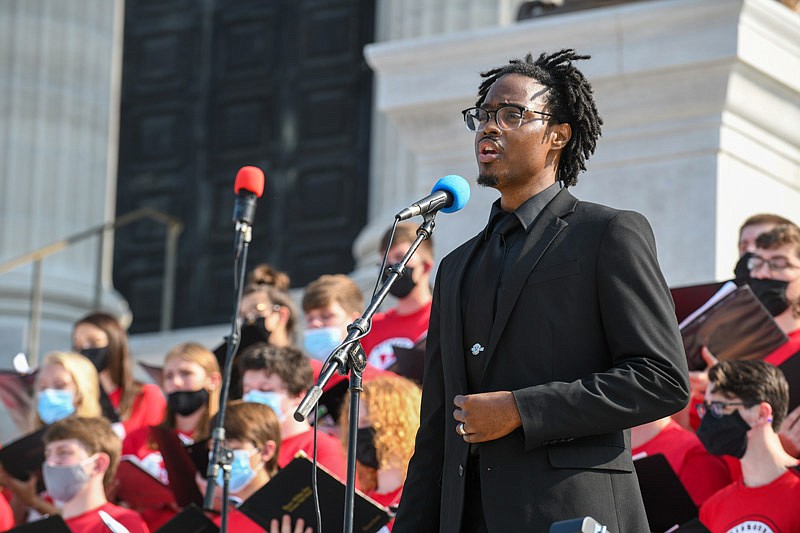"Today is the day the Lord made," and "We shall overcome."
Those were the words inspiring Gov. Mike Parson on Tuesday morning as Missouri kicked off its bicentennial celebrations with an official commemoration ceremony on the state Capitol steps.
The ceremony proclaiming Aug. 10, 2021, as Missouri Bicentennial Day included a federal stamp dedication, poetry reading, performances by a Missouri National Guard band and an all-state choir, and speeches from Mayor Carrie Tergin, State Historical Society Executive Director Gary Kremer, Missouri Chief Justice Paul Wilson and Parson.
The first quote was said to the crowd of a few hundred attendees by the Rev. Robert Kurwicki, of the Jefferson City Diocese, in his opening prayer.
The second quote is from a gospel song performed by Robert Gibson and the Missouri Choral Directors Association All-State Festival Choir.
Parson said hearing Gibson, who arranged and soloed "We Shall Overcome," made him think of Missouri's past trials and helped put current issues into perspective.
"I hear a young man like you singing that to everyone out there, it's not the first time we've been through tough times in our state's history," Parson told Gibson. "But when I hear somebody like you singing that, I felt like that was coming from your heart just as much as your voice, and I want to thank you for telling us all and sending the message today, whatever the challenges are, we are going to overcome because we live in one of the best states in the United States."
Photo Gallery
Little Rock snowfall
Little Rock received its first accumulating snowfall overnight Tuesday into Wednesday.
After the ceremony, multiple people asked Gibson for his autograph and shared similar sentiments about being inspired.
Gibson, a professor at Missouri State University and choir director at Reed Academy in Springfield, said he teaches his students to express from within.
"That's something I'm glad he pointed out, because that's something everyone should do when they sing," Gibson said. "They should express not just from the words, but express from a true place of love, joy and true understanding of what you're singing about."
Amber Renae, Gibson's wife, said she thought there were many important statements made throughout the program, but the determined message of Gibson's song was one that people needed to hear.
Gibson said it was a life-changing moment.
A welcome from Tergin and the opening prayer by Kurwicki started the ceremony.
Shortly after, Kremer, executive director of the State Historical Society of Missouri, talked about the state's rich history and lasting diversity.
"The world we have inherited from (historic Missourians) is complex," Kremer said. "Over the course of the past two centuries, we have become a complicated, diverse, interesting people numbering more than 6 million, living in a complex, heterogeneous, intriguing place."
Kremer pointed to the variety of political leanings, regional associations, agricultural landscapes and topographical geography found around Missouri's cities as some of the state's greatest strengths.
The ceremony then turned its focus to the new U.S. Postal Service stamp commemorating Missouri's bicentennial.
The stamp depicts the Bollinger Mill State Historic Site and features the state's oldest covered bridge.
"The Postal Service's commemorative stamp program honors the best of America's heritage, heroes and history, and it reflects the diverse people and experiences that have shaped our nation," said Peter Pastre, vice president for government relations and public policy at the U.S. Postal Service. "This is certainly true with our Missouri statehood forever stamp, celebrating the bicentennial of the Show-Me State."
After Pastre's remarks, the stamp design was unveiled to an uproar of applause.
Ceremony attendee Mary Lou Bieri, of Jefferson City, said she enjoys how the stamp reflects Missouri's rural traditions and sites.
The stamp became available for purchase online and at local post offices after the ceremony.
After the stamp dedication, the Missouri Choral Directors Association All-State Festival Choir performed four songs: "Joy," "We Shall Overcome," "Hard Times (Come Again No More)" and "Lift Every Voice and Sing."
All of the choir pieces were created by Missouri composers, and state university conductors led the choir.
Warner Bailey, a Boonville teacher who attended the ceremony to support one of his students in the choir, said he enjoyed the ceremony, particularly the music and stamp unveiling.
"We're proud of our state we live in, and it was the perfect day for it," Bailey said.
The ceremony continued with remarks by Missouri Supreme Court Chief Justice Paul Wilson, who delivered a message of unity and commonality.
"As I think about all that Missouri history includes and all that our history means, I'm proud," Wilson said. "Not always of what happened or why - because Missouri and Missourians have our fair share of shortcomings - but I am proud that our history is what we made it, together."
After a performance of "Missouri Waltz" by the Missouri National Guard's 135th Army Band, the state's sixth Poet Laureate Maryfrances Wagner read her poem detailing Missouri's natural beauty in all four seasons.
Parson spoke last to officially proclaim Tuesday, Aug. 10, 2021, as Missouri Bicentennial Day and share the day's significance to him personally.
"It's a humbling experience to be the guy that gets to be here for the 200th celebration," Parson said. "For me and the first lady both, to be in that part of history is pretty remarkable from where we both came from, so we want to enjoy the day, but it's all on the behalf of Missourians out there."
U.S. Sen. Roy Blunt was also scheduled to speak but was unable to attend because of a vote on a federal infrastructure bill.
Bicentennial coordinator Michael Sweeney said the event was a success.
"This worked out as just a beautiful and wonderful ceremony," Sweeney said. "There's so much hustle and bustle, but when you sit there, and I was listening to the band and choir practice in the Rotunda, it does make you go, oh yeah, there is something actually kind of special happening."


